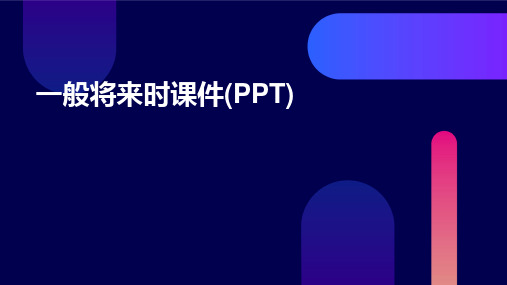小学语法一般将来时(课堂PPT)
合集下载
英语语法 一般将来时(共12张PPT)

上一页
第1页,共12页。
时态:一般将来时 The Simple Future Tense
3、 shall与will的区别:
shall常用于第一人称(we/ I ).
shall
否定式:shall not = shan’t
缩略形式 ’ll
will常用于第二、三人称,但在口 will 语中各种人称都可以用will.
is about to leave for Beijing. eg: He Will there be only one country?
注:after+时间段,往往指过去的一段时间。
next Saturday. We will start off in ten minutes.
I was about to start out when it
•
Yes, there will. / No, there won’t.
第9页,共12页。
What can you see in this picture?
There will be…将会有
There will be more people. There will be fewer trees. There will be more pollution. There will be more buildings. There will be more cars.
supper time.
上一页
主菜单 第5页,共12页。
下一页
● 一般将来时 ●
be about to do:表示“即将做某 事”或“将
要做某事” 如come, go, arrive, leave, start, return, meet, get等。
第1页,共12页。
时态:一般将来时 The Simple Future Tense
3、 shall与will的区别:
shall常用于第一人称(we/ I ).
shall
否定式:shall not = shan’t
缩略形式 ’ll
will常用于第二、三人称,但在口 will 语中各种人称都可以用will.
is about to leave for Beijing. eg: He Will there be only one country?
注:after+时间段,往往指过去的一段时间。
next Saturday. We will start off in ten minutes.
I was about to start out when it
•
Yes, there will. / No, there won’t.
第9页,共12页。
What can you see in this picture?
There will be…将会有
There will be more people. There will be fewer trees. There will be more pollution. There will be more buildings. There will be more cars.
supper time.
上一页
主菜单 第5页,共12页。
下一页
● 一般将来时 ●
be about to do:表示“即将做某 事”或“将
要做某事” 如come, go, arrive, leave, start, return, meet, get等。
(完整版)一般将来时课件(PPT)

①
②
③
① Who will have an English party next week ?
② What will they have next week ?
③ When will they have an English party?
2. be going to 表将来
will 和be going to 的区别
回答:(肯)Yes,主语+will. (否)No,主语+won’t.
Yes,they will./No,they won’t.
They won’t(will not) have an English party next week.
注意:won’t=will not
(3).变特殊疑问句
They will have an English party next week.
他现在在北京。 He __i_s_ in Beijing now.(be)
他昨天在上海。
He w__a_s in Shanghai yesterday. (be) Hew_i_ll_be in Shanghai tomorrow. (be)
二、一般将来时的时间状语
1.与“tomorrow一家” 连用:
buy the oranges tomorrow?
2.Who _w_i_ll_i_n_ve_n_t (invent) a new
computer in 2050? 3.We _w_il_l _g_o (go) to the cinema next
Sunday. The film _w_il_l _b_e (be) very
6. He usually _g_e_t_s (get) up at 6 in the morning. Look! He i_s_g_e_t_t_in(gget) up now. But yesterday he _g_o_t_ (get) up very late, so he _w_e_n_t (go) to
(完整版)一般将来时课件(PPT)

tomorrow the day after tomorrow tomorrow morning tomorrow afternoon tomorrow evening at 7:00 tomorrow morning ……
2.与“next一家” 连用
next
time year week month term Monday at 7:00 next Sunday morning ……
2.He will find some meat in the fridge soon. (变一般疑问句) W __i_ll he _f_in_d _a_n_y_ meat in the fridge?
3.She will stay there in a week. (对划线部分提问) __H_o_w _s_o_on_ w_i_ll__ she _s_t_a_y_ there?
We will/shall go to Beingjing next week.
He will go to Beingjing next week
(2).变一般疑问句和否定句:
They will have an English party next week. Will they have an English party next week?
2. be going to+do可表示事先计划的意图,而 will 则表示说话人当时决定的意图;
We're going to drive you home after the meeting. Don't call a taxi. We'll drive you home.
I feel ill now, and I'll go to see the doctor. I'm going to see the doctor this evening.
2.与“next一家” 连用
next
time year week month term Monday at 7:00 next Sunday morning ……
2.He will find some meat in the fridge soon. (变一般疑问句) W __i_ll he _f_in_d _a_n_y_ meat in the fridge?
3.She will stay there in a week. (对划线部分提问) __H_o_w _s_o_on_ w_i_ll__ she _s_t_a_y_ there?
We will/shall go to Beingjing next week.
He will go to Beingjing next week
(2).变一般疑问句和否定句:
They will have an English party next week. Will they have an English party next week?
2. be going to+do可表示事先计划的意图,而 will 则表示说话人当时决定的意图;
We're going to drive you home after the meeting. Don't call a taxi. We'll drive you home.
I feel ill now, and I'll go to see the doctor. I'm going to see the doctor this evening.
一般将来时课件(PPT)

“be able to”表示将来有能力做某 事时,使用一般将来时形式,例如“I will be able to help you”。
情态动词如“can”、“may”、 “must”等,在一般将来时中通常直 接加动词原形,例如“I can swim”。
03
一般将来时在句子中的运用
陈述句中的使用
表示将要发生的动作或存在的状态
纠正方法
应使用正确的将来时形式,如 "He will go to the park tomorrow." 或 "He is going to the park tomorrow."
忽略动词变化规则
错误示例
They will play football in the future.(忽略了动词play在将来时中的变化)
纠正方法
在将来时中,应使用正确的助动词或情态动词形式,如 "I will be able to help you with your homework." 或 "I can help you with your homework."
错误示例
He will must finish his work before leaving.(错误地使 用了情态动词must)
作用
用于表示未来的计划、打算、预测、 假设等。
常见表达形式
will + 动词原形
表示将来的动作或状态,如“I will go to the park tomorrow.”(我明天将去公园。)
be going to + 动词原形
表示计划、打算或即将发生的动作,如“I am going to study hard this semester.”(我这 学期打算努力学习。)
一般将来时态讲解(共25张PPT)

• I wonder what will happen. • 我不知道将会发生什么事。
• I don't think the test will be very difficult. 。
②用于“祈使句 + and + 陈述句” 中
I don’t think it will rain this afternoon.
I am hungry. I think I’ll have something to eat.
表示看法,观点
“There be”句型的一般将来时 肯定句: There will be +名词+其他成份 [注意]:无论后面加单数名词或复数形式,be都必须用原形。
shall适用于第一人称I,We;而will适用于所有人称。 通常可以用will来代替shall。 will,shall均可缩写为:'ll,如:
I will= I'll; she will = she’ll;will not 和shall not分别可以 缩写为 won't 和shan't。
1.一般将来时的用法
4. be about to + 动词原形。 表示 (1)“即将做”或“马上做”
(2)因此,句子不能再用时间状语。
Don’t leave. Li Lei is about to come. 不要走了,李蕾就要来了。 Be quiet. The concert is about to start. 安静下来,音乐演唱会就要开始了。
• My uncle will come to see me every Saturday.
• 我叔叔每个星期六都会来看我。
• The students will have five English classes per week this term.
• I don't think the test will be very difficult. 。
②用于“祈使句 + and + 陈述句” 中
I don’t think it will rain this afternoon.
I am hungry. I think I’ll have something to eat.
表示看法,观点
“There be”句型的一般将来时 肯定句: There will be +名词+其他成份 [注意]:无论后面加单数名词或复数形式,be都必须用原形。
shall适用于第一人称I,We;而will适用于所有人称。 通常可以用will来代替shall。 will,shall均可缩写为:'ll,如:
I will= I'll; she will = she’ll;will not 和shall not分别可以 缩写为 won't 和shan't。
1.一般将来时的用法
4. be about to + 动词原形。 表示 (1)“即将做”或“马上做”
(2)因此,句子不能再用时间状语。
Don’t leave. Li Lei is about to come. 不要走了,李蕾就要来了。 Be quiet. The concert is about to start. 安静下来,音乐演唱会就要开始了。
• My uncle will come to see me every Saturday.
• 我叔叔每个星期六都会来看我。
• The students will have five English classes per week this term.
一般将来时课件ppt(共17张PPT)

Jim going to
afternoon?
in the playground tomorrow
4. .Jim is going to play football in the playground tomorrow afternoon.
Jim going to play football tomorrow afternoon?
2)在浊辅音和元音后读/d/.
一般过去时, 要用动词过去式. Jim is going to play football in the playground tomorrow afternoon.
Jim is going to play football in the playground tomorrow afternoon. ⑵are变为were。
there were many beautiful flowers there. 一般将来时表示将来某个时间要发生的动作或存在的状态常与表示将来的时间状语连用
⑴am ,is变为was。
So she They to read some books.
What did they do in the park? 1)在清辅音后读/t/ .
(3).动词过去式变化规则
a)一般情况下,直接加ed.如:wash--washed, look---looked; b)以不发音字母e结尾的,加d.如:like---
liked, dance---danced; c)以“辅音字母+y”结尾的,变y为i再加ed. 如:study---studied;
food and (play) lots of games. They
(come) home at 4:30.
一般将来时PPT课件

05
解析
含有will的句子改为否定句时 ,在will后加not,缩写为 won't。
06
THANKS
感谢观看
06
一般将来时练习题精选与解析
选择题精选与解析
01
题目:I _______ to the cinema. Will you go with me?
02
A. go B. am going C. have gone D. went
选择题精选与解析
答案:B
解析:由后一句“Will you go with me?”可知是打算去做某事,是一般将来时,所以用现 在进行时表将来,选B。
题目:— What _______ you _______ to do tomorrow?
选择题精选与解析
— I _______ visit my uncle. A. are; going; am going B. are; going; am going to
C. are; going to; am going D. are; going to; am going to
区别
现在进行时强调当前正在进行的动作 或状态,而一般将来时则强调未来将 要发生的动作或状态。
联系
两者都可用于表示将来的情况,但侧 重点不同。现在进行时通过现在正在 进行的动作暗示将来,而一般将来时 则直接表达将来的动作或状态。
与过去将来时的区别与联系
区别
过去将来时表示从过去某一时间 看将要发生的动作或状态,而一 般将来时则是从现在看将来要发 生的动作或状态。
表示将来经常发生的动作或习惯
常用的时间状语
always, often, usually等 。
句子结构
小学语法一般将来时PPT课件

They are going to have a trip.
He is going to make a plane model.
I am going to get up early.
2020/3/26
5
一般将来时
否定句 主语+be(am/is/are ) not going to+动词原形+…
She isn’t going to see a movie.
C.还可以表示安排或计划中的动作。
It’s going to rain soon.
We are not going to see a film together.
2020/3/26
9
一般将来时
2、用will构成的将来时,所表示的动作 与人的主观愿望无关。
I will graduate from this school soon.
You will stay alone after I leave.
2020/3/26
10
一般将来时
3、shall和will在口语的一些疑问句中相 当于情态动词。Shall一般与第一人称连 用,will多与第二人称连用。
Shall we go to the zoo next Saturday?
Will you please open the box for
一般将来时
2020/3/26
1
一般将来时
2020/3/26
2
一般将来时
2020/3/26
3
结构一:般将来时
•1、主语 +be(am/is/are ) going to+动词原形 +…
2020/3/•26 2、主语+will+动词
- 1、下载文档前请自行甄别文档内容的完整性,平台不提供额外的编辑、内容补充、找答案等附加服务。
- 2、"仅部分预览"的文档,不可在线预览部分如存在完整性等问题,可反馈申请退款(可完整预览的文档不适用该条件!)。
- 3、如文档侵犯您的权益,请联系客服反馈,我们会尽快为您处理(人工客服工作时间:9:00-18:30)。
2020/6/2
7
一般疑问句
Shall we go to the park?
Ok, let’s go.
Shall I…?/Shall we…?的句型通常用来征 求对方的意见。
2020/6/2
8
一般将来时
1、am/is/are going to + 动词原形:
A.表示打算或准备要做的事情;
B.也可以表示主观判断即将要发生的事情;
me? 2020/6/2
11
一般将来时
2020/6/2
1
一般将来时
2020/2
3
结构一:般将来时
•1、主语 +be(am/is/are ) going to+动词原形+…
•2、主语+will+动词原
形+… 2020/6/2
4
一般将来时
肯定句
主语+be(am/is/are ) going to+动词原形+…
You will stay alone after I leave.
2020/6/2
10
一般将来时
3、shall和will在口语的一些疑问句中相 当于情态动词。Shall一般与第一人称连 用,will多与第二人称连用。
Shall we go to the zoo next Saturday?
Will you please open the box for
C.还可以表示安排或计划中的动作。
It’s going to rain soon.
We are not going to see a film together.
2020/6/2
9
一般将来时
2、用will构成的将来时,所表示的动作 与人的主观愿望无关。
I will graduate from this school soon.
They are going to have a trip.
He is going to make a plane model.
I am going to get up early.
2020/6/2
5
一般将来时
否定句 主语+be(am/is/are ) not going to+动词原形+…
She isn’t going to see a movie.
I am not going to watch TV.
2020/6/2
6
一般将来时
一般疑问句
Be(Am/Is/Are )+主语+going to+动词原形+…?
Are your brothers going to play the computer?
Yes, they are. / No, they aren’t.
